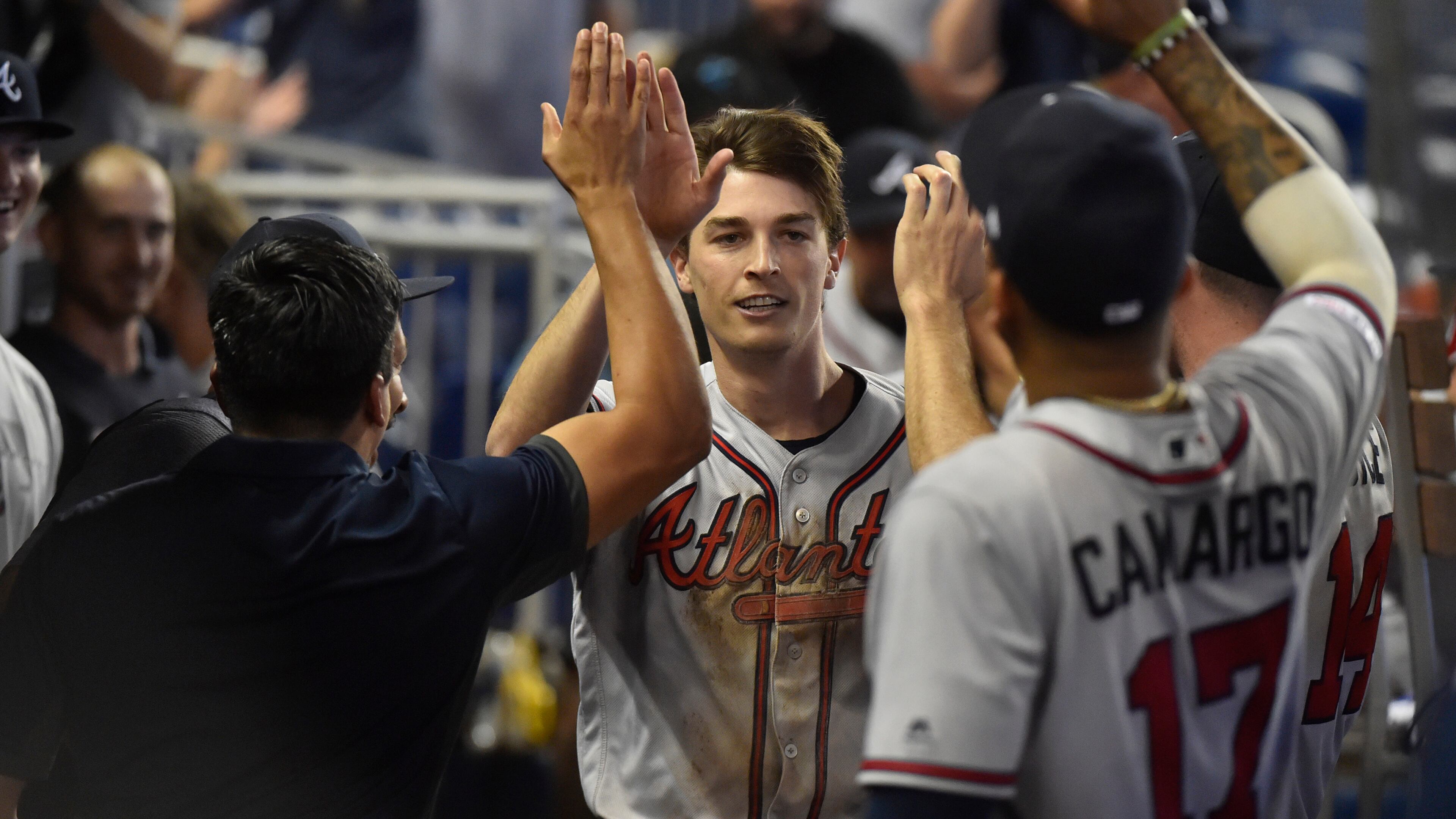The Braves’ season is about to get serious

The nice thing about having the Marlins in your division is that you have six chances to get well every year. Since Brian Snitker took over in May 2016, the Atlanta Braves have won or split 11 of 13 series against Miami. They were 14-5 against the Marlins last season; they're 5-1 this year. Sunday's 10th-inning win? That was the fifth time over 2.2 seasons they've scored the winning run in their final at-bat against the Marlins on a Sunday afternoon.
The less-nice thing about having the Marlins in your division is that facing them can skew reality. Twenty-nine MLB teams have won between 12 and 22 games; the nine-win exception is based in Dade County. The Braves went to Florida having lost 12 of 18 games. On Sunday, they headed for Los Angeles on a three-game winning streak, having drawn within a game and a half of first-place Philadelphia in the National League East. They did what they needed to do.
Starting Monday night, things figure to get harder. Over the next three weeks, the Braves will play 20 games, 16 of them against teams currently holding a better record than theirs — three in L.A., four in Phoenix, seven against St. Louis there and here, three against Milwaukee here. (The soft spot is a four-game set in San Francisco.) Come Memorial Day, we’ll have a better idea about these Braves.
Through 34 games, we’ve gotten mixed signals. Bullpen follies marred the first few weeks, but — as Snitker noted after Thursday’s 11-2 loss to San Diego — these relievers were showing signs of improvement. On cue, his bullpen worked 13-1/3 innings in Miami, more than half of that coming after Kevin Gausman was ejected for throwing behind Jose Urena on Friday, while yielding only two earned runs. But that was against Miami, which has scored 18 fewer runs than any other team. Ergo, maybe not the best indicator.
The Braves scored 20 runs over three games in Miami; they’d managed 13 over four against the Padres. Most of their batting stats look good — they’re fourth among NL clubs in runs and OPS, second in batting average — but they’re ahead of only Miami in OPS with runners in scoring position. That’s one of those numbers that should level out. If it doesn’t, they won’t be repeating as division champ.
The pitching must improve. The Braves are 10th in the league in starters’ ERA, eighth in bullpen ERA. The nice thing about the rotation is that Mike Soroka (ERA of 1.14) and Max Fried (2.11) have been tremendous. Julio Teheran has been borderline as a No. 5 starter, which is to say he’s a borderline starter, period. Gausman’s first three starts were good; the two before his aborted turn in Miami weren’t.
The bigger worry is Mike Foltynewicz. He has made two big-league starts since his return from elbow soreness. He insists he’s fine. The data makes us wonder. He has struck out eight over 10-1/3 innings; last year he struck over 202 over 183. The velocity on his four-seamer is down by 2.5 mph from last season; the velocity on his slider is down by 1.1 mph. Per Brooks Baseball, opponents hit .106 against his slider last season; in his two 2019 starts, they’ve hit .400.
We say again: The Braves should never lack for starting pitching. Sean Newcomb has returned to the majors after what’s being described as a beneficial demotion to Gwinnett. He’s serving as the long reliever for now, but that could/should change. Touki Toussaint worked four excellent innings after Gausman was thumbed – mighty convenient that the Braves had promoted Toussaint that very day, eh? – and shouldn’t be dismissed as a starting candidate because of one horrid outing against Trevor Bauer on a cold Cleveland night.
And don’t sleep on Austin Riley. The third baseman has an OPS of 1.014 — that’s great, FYI — with 10 homers and 27 RBIs for Gwinnett. The Braves sank $23 million into Josh Donaldson, who has been pretty good, so there’s no immediate place for Riley to play, and the presence of Johan Camargo and Charlie Culberson mitigates against any notion of Riley being deployed in the outfield, but still: The guy needs to be here next year, if not before.
But enough about down-the-road stuff. Upcoming is a three-week test for these Braves, who have done enough to hang around in the East without approaching peak capacity. Still, Luke Jackson hasn’t yet flunked the audition as closer, which means the Braves have made it through another week without Craig Kimbrel, and there’s no reason to believe anyone among this everyday eight — except maybe Nick Markakis, again — can’t do better.
After 34 games, there’s more reason to feel good than bad. (If you want bad, check the 14-19 Nationals; they’re last in the NL in ERA with big-ticket pitchers Max Scherzer, Stephen Strasburg and Patrick Corbin.) By Memorial Day, we’ll know more. And if the next three weeks are underwhelming for the Braves … well, they’ve still got 13 games left against the Fish.

